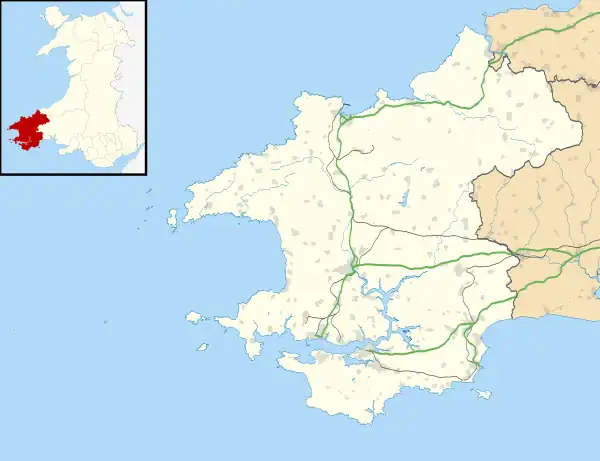| Tufton | |
|---|---|
 Tufton Arms pub in 2007 | |
 Tufton Location within Pembrokeshire | |
| OS grid reference | SN040282 |
| Community |
|
| Principal area | |
| Country | Wales |
| Sovereign state | United Kingdom |
| Post town | Clarbeston Road |
| Postcode district | SA63 |
| Dialling code | 01348 |
| Police | Dyfed-Powys |
| Fire | Mid and West Wales |
| Ambulance | Welsh |
| UK Parliament |
|
| Senedd Cymru – Welsh Parliament |
|
Tufton is a crossroads hamlet in the parish of Henry's Moat in Pembrokeshire, Wales, on the B4329, a road between Eglwyswrw and Haverfordwest across the Preseli Hills. It is in the community of Puncheston.
Name
The origin of the place name Tufton is not clear. There is a tenuous link with the Tufton Arms in the 1792 marriage of Joseph Foster Barham of Trecwn (who inherited Pembrokeshire property from his mother, Dorothea Vaughan,[1] and whose son Charles Henry was a Pembroke JP) to Lady Caroline Tufton, daughter of Sackville Tufton, 8th Earl of Thanet.[2][3]
Inn
The Tufton Arms inn stands at the crossroads. The pub holds a beer festival on the first Friday in July.[4] According to a 19th-century map, this was the only inn in the parish.[5] Coursing meetings were hosted by the pub in the mid-1800s[6] and, in a fox hunting report, it was described as having "good beer".[7] In 1863, the landlady, Mrs Thomas, died "at an advanced age".[8] A Mr Thomas was landlord in 1868, when he was called as a witness in Haverfordwest in a case of sheep-stealing.[9] The thief, Caleb Morris, was sentenced to five years, and later Thomas, after a collection, was presented with a watch in recompense for his sheep.[10] It was the annual custom of the Reverend C. H. Barham to entertain his tenants and friends at Thomas's inn, which in 1873 was able to provide a roast dinner and ale for "upwards of 90 persons".[11]
Chapel
Siloh Chapel is a Calvinistic Methodist chapel in the Union of Welsh Independent churches.[12] It was founded in 1842, registered to solemnise marriages in 1844,[13] and restored in 1900.[14] Short biographical details of the early ministers and members of the congregation appeared in a history published in 1871.[15]
Transport
Tufton is on the B4329, a centuries-old route between Cardigan and Haverfordwest and is on a bus route. National Cycle Route 47 crosses the B4329 at Tufton.
Blaenwern
The hymn tune Blaenwern is named after a farm near Tufton where the composer, William Penfro Rowlands, was either sent as a boy or sent his son, to recuperate from an illness in the early 20th century.[16]
Historic structures
"Tufton Castle" is the name given by Coflein to an enclosure just north of the hamlet, which may have been an ancient Iron Age settlement.[17] Coflein records a mediaeval strip field system, identified from aerial reconnaissance in 2007[18] and a post-mediaeval rubble stone house worthy of note.[19] An 1888 map shows a smithy at the crossroads.[20]
Richard Fenton, in the early 19th century, described a small roadside house as Poll-tax Inn.[21] Fenton attributes the name to a place where poll tax was collected, but other names have been used, such as Paltockes Inne in 1200,[22] Paltocksin, Battog's Inn or Baltox Inn.[23] It appears on an old parish map south of Tufton on the B4329, which has now bypassed the place (the old road forded a stream, shown on modern maps as Portrux Ford), which is in the parish of Castlebythe.[24]
References
- ↑ "The History of Parliament". Retrieved 17 May 2015.
- ↑ Charles, B. G. (1959). "BARHAM family, of Trecŵn, Pembrokeshire". Dictionary of Welsh Biography. National Library of Wales. Retrieved 19 July 2019.
- ↑ "History of Parliament Online: FOSTER BARHAM, Joseph (1759-1832), of Trecwn, Pemb". Retrieved 19 July 2019.
- ↑ "CAMRA Pembrokeshire". Retrieved 16 May 2015.
- ↑ "GENUKI: Parish map (No.48)". Retrieved 16 May 2015.
- ↑ "Pembrokeshire Coursing Club". The Pembrokeshire Herald. 9 February 1849. Retrieved 20 July 2019.
- ↑ "Pembrokeshire fox-hounds". The Pembrokeshire Herald. 15 November 1844. Retrieved 20 July 2019.
- ↑ "Family Notices". The Pembrokeshire Herald. 22 May 1863. Retrieved 20 July 2019.
- ↑ "Letters". The Pembrokeshire Herald. 3 April 1868. Retrieved 20 July 2019.
- ↑ "Local Intelligence". Potter's Electric News. 29 July 1868. Retrieved 20 July 2019.
- ↑ "Henry's Moat". The Pembrokeshire Herald. 16 May 1873. Retrieved 20 July 2019.
- ↑ Lloyd, T., Orbach, J and Scourfield, R. (2004). Pembrokeshire. Yale University Press. p. 226. ISBN 9780300101782. Retrieved 17 May 2015.
{{cite book}}: CS1 maint: multiple names: authors list (link) - ↑ "Siloh Chapel: Notice". The Pembrokeshire Herald. 24 May 1844. Retrieved 20 July 2019.
- ↑ "GENUKI: Henry's Moat". Retrieved 16 May 2015.
- ↑ Rees, T. and Thomas, J. (1871). History of the Welsh Independent Churches. Retrieved 16 May 2015.
{{cite book}}: CS1 maint: multiple names: authors list (link) - ↑ Humphreys, M. and Evans, R. (1997). Dictionary of Composers for the Church in Great Britain and Ireland. A&C Black. p. 295. ISBN 9780720123302. Retrieved 16 May 2015.
{{cite book}}: CS1 maint: multiple names: authors list (link) - ↑ "Tufton Castle (304480)". Coflein. RCAHMW. Retrieved 31 July 2019.
- ↑ "Strip field system, Tufton (412128)". Coflein. RCAHMW. Retrieved 31 July 2019.
- ↑ "Home Tufton (720)". Coflein. RCAHMW. Retrieved 31 July 2019.
- ↑ "Royal Commission: Tufton". Retrieved 31 July 2019.
- ↑ Fenton, R. (1811). A Historical tour through Pembrokeshire. Longman, Hurst, Rees, Orme & Co. p. 356. Retrieved 17 May 2015.
Poll Tax Inn.
- ↑ Smith, P. (1988). Houses of the Welsh Countryside: A Study in Historical Geography. Royal Commission on the Ancient and Historical Monuments of Wales. p. 352. ISBN 9780113000128. Retrieved 17 May 2015.
- ↑ "Royal Commission: Historic Place Names". Retrieved 31 July 2019.
- ↑ "GENUKI: Parish maps (Nos. 48 & 49)". Retrieved 16 May 2015.